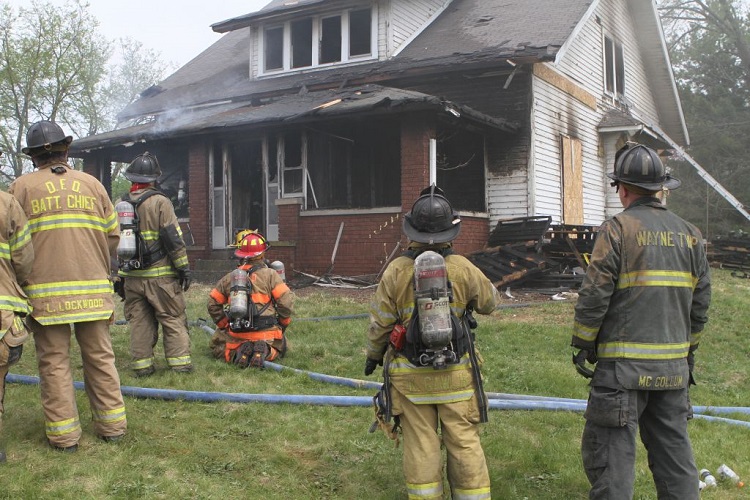
Photo by Tim Olk.
By Anthony Rowett Jr.
Every firefighter’s goal should be to continuously improve his knowledge and abilities. Accomplishing this goal is achieved through effective training. For training to be effective, it must teach the firefighter new information or skills or it must improve the firefighter’s current knowledge and skills. Effective training requires the firefighter to get outside of his comfort zone in two ways: Firefighters must seek training on fireground operations that they do not perform on a regular basis and from other sources than the firefighters with which they typically train as well as outside of their own fire department.
Exiting the comfort zone regarding training is extremely important to the formation of functionally versatile firefighters. Functionally versatile firefighters can perform all fireground operations—including the common and uncommon types—effectively and efficiently. For example, an engine company firefighter should continue to train on hoseline operations, but it is also important for him to train on other fireground operations such as forcible entry and search and rescue or any other operation he may be assigned.
People tend to stay within their comfort zone when it comes to knowledge, which is why firefighters tend to train on the topics that they perform most commonly. The problem with this tendency is that it does not test or improve a firefighter’s knowledge and skill nor does it present to him new knowledge or skills.
For example, rapid intervention team (RIT) operations are assigned to an engine company by fire departments based on the arrival order of engine companies on the fireground (i.e., the automatic assignment of the third-arriving engine company). Operations performed by the RIT are typically considered truck company operations, but the RIT assignment is typically given to an engine company, requiring these engine company firefighters to be functionally versatile and perform any required fireground operation effectively and efficiently. So, if the engine company firefighters train on what they do most, which is engine company operations, and they do not go outside their comfort zone and train on those operations, they will not create an effective RIT when assigned this task on the fireground.
RELATED: UL-FSRI: Vent, Enter, Search Training ‖ Zehnder on Rural Connections: The Importance of Training ‖ Training Minutes: Multiple Stacked Locks
All firefighters should also go outside of their comfort zones regarding the training provider. Firefighters should not receive all their training from the same source; they should seek it from multiple instructors as well as from providers outside of their own department. Not all departments perform the same fireground operations using the same tactics and techniques. Engaging other department firefighters on their fireground tactics allows you increase the number of “tools in the toolbox” and can improve firefighters’ fireground performance in one of two ways. First, the firefighter may learn a technique that allows him to perform the operation more effectively than the method his department was using previously. Second, when he performs an operation that is unsuccessful, he is now aware of additional tactics or techniques that he can use to achieve success the next time out. There are many tactics and techniques that began in one department that have since spread throughout the country such as the Detroit (MI) bundle hoseline, the Cleveland (OH) hose load, and the Escambia (FL) cut for forcing entry through a garage door, just to name a few.
By leaving their comfort zones through performing training evolutions for skills they rarely use as well as by seeking tactics and techniques from other departments, firefighters can improve their overall knowledge and effectiveness. The motto of the Magic City Truck Academy is “Good Enough Never Is”; this applies directly to the concept that firefighters must think outside the box and leave their comfort zones when it comes to training. The firefighter who refuses to exit his comfort zone when training by either performing training evolutions or learning from instructors exclusive to his department are taking the stance that their training and their fireground capabilities are “good enough.”
When a firefighter is confronted with a situation he has never encountered or a tactic that he has never used, his department has failed to accomplish the mission, and the firefighter’s training and fireground capabilities will no longer be good enough. And, say, when an engine company is assigned RIT responsibilities at a structure fire, and that engine company has never gotten out of its comfort zone and trains on truck company skills such as forcible entry and search and rescue, its capabilities and effectiveness will be insufficient when a Mayday situation arises, which may result in a line-of-duty death.
Anthony Rowett Jr. is a captain with the Mobile (AL) Fire Rescue Department. He was previously a firefighter for the Ogdensburg (NJ) Fire Department. Rowett has an associate’s degree in fire science technology from the County College of Morris in New Jersey and a bachelor’s and master’s degree in fire science and emergency services management, respectively, from Columbia Southern University. He has been published in Fire Engineering and Fire Rescue. You can contact Rowett at rowett88@yahoo.com.

